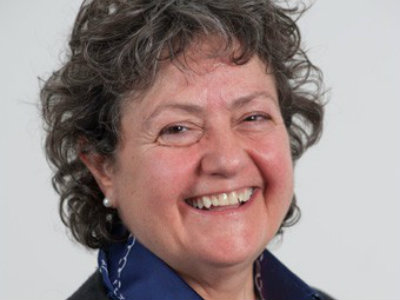
Public investment in social work practice placements and continuing professional development should increase, the chief social worker for adults has said.
Lyn Romeo also strongly backed the retention of generic qualifying training for social workers and warned that specialised degrees would fail to prepare social workers adequately for a practice environment in which adaptability was becoming more and more important.
She also stressed that a proposed ‘Frontline-style’ fast-track qualifying programme focusing on mental health should cover practice across all ages, not just with adults.
Her comments, in an interview with Community Care, came in response to the publication of David Croisdale-Appleby’s review of social work education for the Department of Health.
Croisdale-Appleby argued for increases in funding in several areas of social work education, including: practice placements, through the government’s education support grant; the assessed and supported year in employment, and to introduce a more comprehensive continuing professional development programme.
Funding for practice education must rise
His views were backed by Romeo, who said: “It’s really important that students experience really good placements. We need to have the resources and capacity to make that happen. We need to have more investment going into that. I would also support more investment going into the continuing professional development of social workers. We have existing social workers who are going to form the majority of the profession.”
Croisdale-Appleby suggested his funding plans could be implemented by reducing, or even phasing out, bursaries for undergraduate social work courses, but it is not clear whether the government will be minded to back his proposals.
Croisdale-Appleby’s report followed that of Martin Narey’s review, for the Department for Education, into the education of children’s social workers.
Though the reports had common themes – such as calling for tougher regulation of social work courses, including oversight of practice placements – they diverged in crucial areas.
Generic degree backed
Notably, Narey called for the introduction of children’s social work degrees that would allow students to specialise in this area of practice after a generic first year. However, Croisdale-Appleby warned that specialised initial training would leave graduates “with their capabilities very largely in a single field”, and that evidence he received showed that social work required “a thorough understanding of all stages of the life course”.
Romeo strongly backed Croisdale-Appleby’s view. She added: “The landscape of social work is changing all the time with more and more social workers working in different settings, like social enterprises. Social workers have to be well placed to adapt and respond to that changing landscape and to adapt their knowledge and skills to different environments. Training someone to do a job in a particular setting is too restrictive. That’s the point David made and I’m absolutely behind it.”
Her comments come with plans being developed to set up a fast-track initial social work qualification in mental health along the lines of the Frontline scheme focusing on children’s social work.
Romeo stressed that any such fast-track scheme should focus on mental health for people of all ages, not just among adults, and made clear that fast-track schemes in general would remain a minority route into social work.
Fast-track schemes ‘for the minority’
“This would be for a small group of people,” she said. Most social workers will still qualify through mainstream programmes but everybody is concerned to ensure that there are other ways that people can get into social work.”
Romeo said she had started working with chief social worker for children Isabelle Trowler on a statement of what social workers need to know, as part of the government’s response to both Narey’s and Croisdale-Appleby’s reviews.
Such a statement was something Narey explicitly called for in respect of children’s social workers and this recommendation was accepted by education secretary Michael Gove. But Romeo said that the statement would cover the whole of social work.
“That’s work we will do together setting out what all social workers need to know and amplifying what applies to children and families and to adults,” she added.
She said the statement could form the basis for the development of any fitness to practise under which newly-qualified practitioners would face an assessed probationary year that they would have to pass to remain in practice.
This was one of Croisdale-Appleby’s key recommendations but Romeo said it was too early to say whether this would be taken up, as was also the case with his proposal for practitioners to have their fitness “revalidated” every five years to stay in practice.
“We are on a long journey and we don’t quite know what the destination will be yet,” she added.
She said she believed the existing system of requiring social workers to re-register with the Health and Care Professions Council every two years provided a “robust framework”. Under the HCPC’s re-registration system, which will be applied to social workers for the first time this year, social workers must provide a record of their continuing professional development over the previous two years.
The HCPC will pick 2.5% of practitioners picked at random who will be audited on how they had met the regulator’s continuing professional development requirements.




 Bournemouth, Christchurch and Poole
Bournemouth, Christchurch and Poole  Hampshire County Council
Hampshire County Council  Lincolnshire County Council
Lincolnshire County Council  Norfolk County Council
Norfolk County Council  Northamptonshire Children’s Trust
Northamptonshire Children’s Trust  South Gloucestershire Council
South Gloucestershire Council  Wiltshire Council
Wiltshire Council  Wokingham Borough Council
Wokingham Borough Council  Children and young people with SEND are ‘valued and prioritised’ in Wiltshire, find inspectors
Children and young people with SEND are ‘valued and prioritised’ in Wiltshire, find inspectors  How specialist refugee teams benefit young people and social workers
How specialist refugee teams benefit young people and social workers  Podcast: returning to social work after becoming a first-time parent
Podcast: returning to social work after becoming a first-time parent  Podcast: would you work for an inadequate-rated service?
Podcast: would you work for an inadequate-rated service?  Family help: one local authority’s experience of the model
Family help: one local authority’s experience of the model  Workforce Insights – showcasing a selection of the sector’s top recruiters
Workforce Insights – showcasing a selection of the sector’s top recruiters 

 Facebook
Facebook X
X LinkedIn
LinkedIn Instagram
Instagram
Comments are closed.